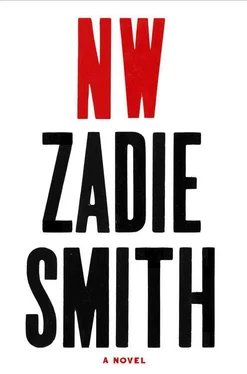Naomi runs ahead and climbs the font (c. 1150, Purbeck marble). Leah tries to escape the aural range of Natalie’s lecture. The service ends: the parishioners begin to file out. In the doorway, the young vicar attempts to engage them. He holds a hand to his doughy waist like a nervous old woman, a flop of brown hair falls across one temple. He has a face that hopes to please but cannot owing to chinlessness. He is as he would have been in 1920 or 1880 or 1660. He is the same, but his congregation is different. Polish, Indian, African, Caribbean. The adults sharply dressed in shiny suits and clinging dresses from the market. The boys wear three-piece pinstripe, the girls clutch tiny Spanish shawls, their hair elaborately pressed and kiss-curled. The congregation pity the vicar, who is full of gentle suggestions. Let’s see if we can start on time next week. Anything you can spare. Anything at all. They smile and nod, not taking him too seriously. The vicar, too, is not listening to himself. He is intent on Leah, seeking her over the heads of his fleeing flock. Light streams in from the east. Leah moves that way instinctively, toward a monument in black and white marble hung upon the wall from which she learns that IT WAS HER HAPPINESS TO MAKE HIM YE JOYFUL FATHER OF 10 SONS & 7 DAUGHTERS AND IT IS HER PIETIE TO DEDICATE THIS MONUMENT TO YE PRESERVATION OF HIS MEMORY. HE DIED IN YE 48 YEAR OF HIS AGE. MARCH YE 24 1647. Nothing further is said of Her. Leah is drawn to put her fingers to the letters to measure their coolness. But Natalie says better not to, she says Spike don’t splash the holy water WOW the same sculptor fashioned the tomb of ELIZABETH 1ST no darling not that one she was a queen darling from LONG AGO no darling from before then even but did you know it was once W I L S D O N meaning well meaning spring at the foot of a hill which is where this water’s coming from I SAID STOP SPLASHING. Leah is suddenly so thirsty, she is made of thirst, she is only thirst. She kneels to examine the tap, reads the sign. Not Potable. Holy, but not potable.
— Mummy!
— No, not Mummy. This is somebody else. “Thought to be more powerful than the traditional Madonna, she has miraculous powers, including: the gift of serendipity, restoring lost memories, resuscitating dead babies…” Marcia would love this — sometimes people see visions of her in the churchyard. Marcia’s always having visions. Usually of white Madonnas, though, with blond hair and nice blouses from M & S….
How did she walk past it? At her back a Madonna, fashioned of jet limewood. The Madonna holds a mammoth baby in swaddling clothes. The Christ Child it says on the sign, his arms stretched out at either side, his hands big with blessing it says on the sign, but to Leah there seems no blessing in it. It looks more like accusation. The baby is cruciform; he is the shape of the thing that will destroy him. He reaches out for Leah. He reaches out to stop any escape, to the right or to the left.
–“becoming the famous shrine of Our Lady of Willesden, “The Black Madonna,” destroyed in the reformation and burned, along with the ladies of Walshingham, Ipswich and Worcester — by the Lord Privy Seal.” Also a Cromwell. Different Cromwell? Doesn’t say. This is where decent history GCSE level teaching would have come in helpful…. “was shrine here since—” wait is this the original then? 1200s? Can’t be. Very craply written, not clear which — NAOMI COME AWAY FROM
“How have you lived your whole life in these streets and never known me? How long did you think you could avoid me? What made you think you were exempt? Don’t you know that I have been here as long as people cried out for help? Hear me: I am not like those mealy-mouthed pale Madonnas, those simpering virgins! I am older than this place! Older even than the faith that takes my name in vain! Spirit of these beech woods and phone boxes, hedgerows and lampposts, freshwater springs and tube stations, ancient yews and one-stop-shops, grazing land and 3D multiplexes. Unruly England of the real life, the animal life! Of the old church, of the new, of a time before churches. Are you feeling hot? Is it all too much? Did you hope for something else? Were you misinformed? Was there more to it than that? Or less? If we give it a different name will the weightless sensation disappear? Are your knees going? Who are you? Would you like a glass of water? Is the sky falling? Could things have been differently arranged, in a different order, in a different place?”
— Oh, I used to faint a lot. A lot! They thought it was a sign of a delicate constitution, sensitive, a bit artistic. But everyone went into the nursing or secretarial back then, you see. That’s simply how it was. We didn’t have the opportunities.
— It was just hot.
— Because you had a lot of potential, no, listen, you did: piano, the recorder, the dancing, the thing with the… the… what’s its name now, oh you know — sculpting — you liked the sculpting for a while, and the violin, you were a wonder on the violin, and lots of little things like that.
— I brought one pot home from school. I played the violin for a month.
— We made sure you had all the lessons, fifty pee here, fifty pee there, it all adds up! And we didn’t always have it! That was your father — God rest him — he didn’t want you to grow up feeling poor, even though we were poor. But you never really settled on the one thing, that’s what I mean. This lawn needs watering.
Pauline stoops down suddenly, coming up with a handful of grass and earth.
— London clay. Very dry. Of course, you girls do everything differently now. You wait and wait and wait. Though what you’re waiting for I don’t know.
Almost purple with the effort, the bowl of white hair damp and flat round her face. Mothers are urgently trying to tell something to their daughters, and this urgency is precisely what repels their daughters, forcing them to turn away. Mothers are left stranded, madly holding a lump of London clay, some grass, some white tubers, a dandelion, a fat worm passing the world through itself.
— Eugh. Probably put the mud down now, Mum.
• • •
They sit together on a park bench Michel discovered some years ago. Somebody had left it in the middle of the road, up at Cricklewood Broadway. Calm as you like! Just sitting there in traffic! It looked like it had grown out of the tarmac. All other cars swerved to avoid it. Michel stopped the Mini Metro, put the seats down flat, opened the boot and wedged it in, with Pauline adding an unhelpful hand, to a chorus of car horns. When they got it home they found it had the seal of the Royal Parks upon it. Pauline calls it the throne. Let us sit on the throne for a wee while.
— It was the heat. Olive, come here, baby.
— Not near me! I don’t want my eyes going up! That’s my grandchild, there. Only one I’m likely to get if things go on the way they are. I’m allergic to my own grandchild.
— Mum, enough!
They sit on the throne in silence, staring out in different directions. The problem seems to be two different conceptions of time. She knows the pull of her animal nature should, by now, be making the decisions. Perhaps she’s been a city fox too long. Every new arrival — the announcements seem to come now every day — feels like a terrible betrayal. Why won’t everybody stay still? She has forced a stillness in herself, but it has not stopped the world from continuing on. And then the things that happen only serve to horribly close down the possibilities of all the other things that didn’t happen, and so number 37, and so the door opening at the moment that she stands there, her hand full of leaflets, and Shar saying: put those down, take my hand. Shall we run? Are you ready? Shall we run? Leave all this! Let’s be outlaws! Sleeping in hedgerows. Following the railway line till it reaches the sea. Waking up with that long black hair in her eyes, in her mouth. Phoning home from fantasy boxes that still take the old 2 pees. We’re fine, don’t worry. I want to stay still and to keep moving. I want this life and another. Don’t look for me!
Читать дальше











